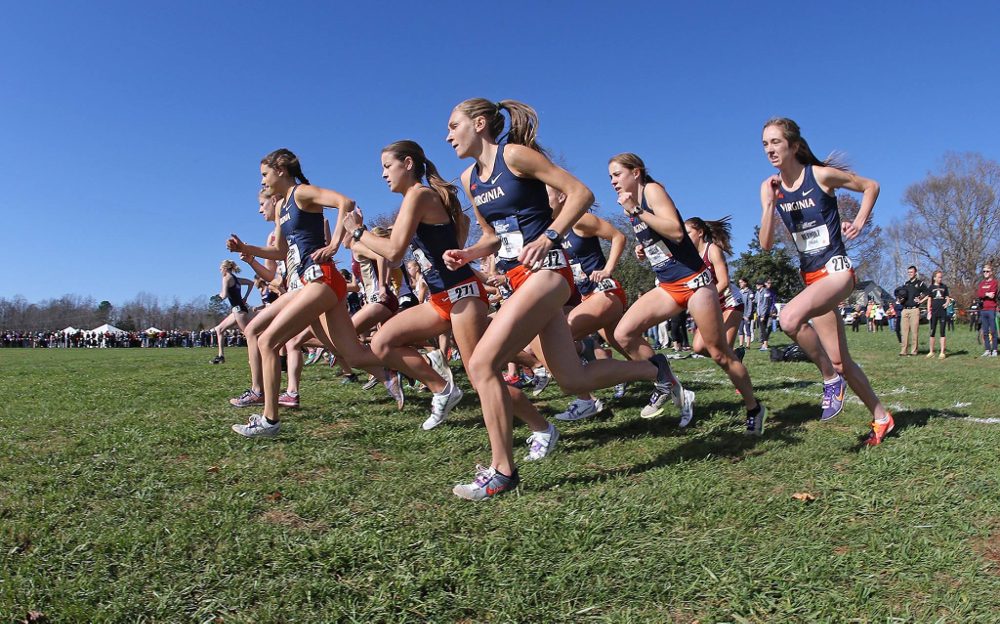Running south of the border: A Canadian’s defence of the NCAA
Cleo Boyd, a product of the NCAA (National Collegiate Athletic Association), defends attending university in the United States

By Cleo Boyd
It’s common for Canadian runners who record fast times in high school to be offered “full-ride” post-secondary scholarships to run and study in the United States. For athletes who find themselves in this position, choosing whether to head south of the border to pursue a collegiate career in the NCAA or stay in Canada to run in U Sports can be challenging.
Although some Canadians may accept the idea that running in the NCAA can have its perks, public discussions surrounding the topic tend to be focused on highlighting the flaws in the system while its advantages (and the disadvantages of U Sports, Canada’s governing body for university athletics) are rarely explored sufficiently.
RELATED: Canadian results from the 2017 NCAA D1 Cross-Country Championships.
Many of the criticisms that Canadians have of the American system are valid; however, the full picture is often left underdeveloped and this can make it difficult for young runners to make fully-educated decisions about which collegiate system will be right for them.
Perhaps the most common criticism that Canadians have against the NCAA is the immense pressure that is, in many ways, inherent in the system. The seriousness of sports culture in the U.S. and the sheer depth of talent that is found in the NCAA, coupled with the obligation that being on a full scholarship assumes, do make for a high-pressure environment. It is exactly these aspects of the system that make participating in it, for many, an invaluable experience.
Sports are a central aspect of American popular culture and, accordingly, the amount of money and time that is devoted to athletics in the U.S. is immense, and unparalleled in Canada. Having so much money invested in teams increases the expectations that are placed on them, and this business-like approach to collegiate sport can be problematic, but it can also be extremely exciting. For the right athlete, the high-stakes environment and the pressure to compete at a high-level year-round, in three seasons (including outdoor track which is not offered in Canada’s university or college systems), can create positive pressure that is motivating rather than overwhelming.
A system with so much money and hype behind it attracts athletes from all over the world creating a depth of talent unparalleled in any other collegiate sports system. Aside from the opportunity to develop relationships with people from across the globe (which is a very special experience in its own right) the depth of the NCAA –while understandably daunting to some — pushes others to realize potential that they may not discover otherwise. The experience of being buried in a field of runners who can match if not better your own talent can function as a reminder of how hard most aspiring runners work if they want to distinguish themselves. In this way, finishing in the middle or near the back of race can be a constructive experience rather than a discouraging one.
Joining a team as a full-scholarship athlete can make the pressure of performing even more intense but it’s important to consider the long-term implications of accepting a “full-ride.” The ability to attend school free of charge (while no solution to the broader problem of college in-affordability) can alleviate the financial pressure that a student-athlete may face in U Sports or the CCAA (Canadian college association). The pressure to perform well at a sport that you enjoy should be seen as a privilege compared with the pressure that many young graduates face when it comes to paying off student debt. The ability to graduate debt-free also means that athletes who plan to pursue a post-collegiate career in running (a sport which few would describe as lucrative) will have more freedom to do so. So, while it is important for young athletes to know what their getting into before they accept a “full-ride”, it is also important for these athletes to be offered a long-term perspective on the benefits that a full-scholarship may entail.
Cautionary tales are important to share with young high school age athletes who are preparing to jump into the unknown, and while they should have their place in the decision-making process, they should not overshadow the full range of experiences that it is possible for Canadians to have in the NCAA.
Kingston, Ont.’s Cleo Boyd competed for Stony Brook University and then the University of Virginia, where she was a multiple-time ACC (Atlantic Coast Conference) champion, in the NCAA Division One and continues to run competitively for Physi-Kult.


